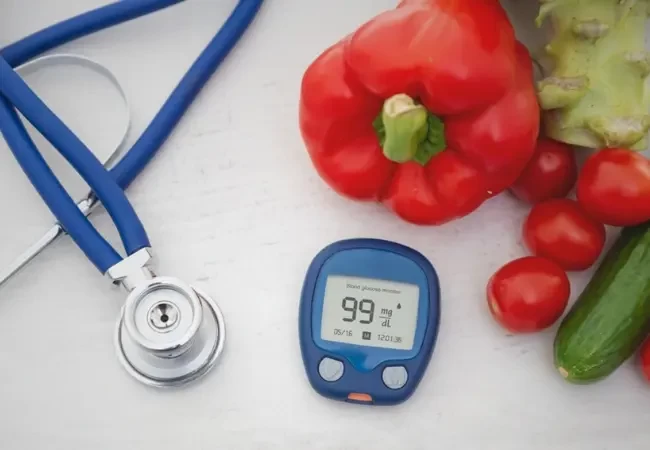Blog
Diabetes

What is Diabetes?
 Medically reviewed by: Dr. Tom Babu, Medical Director, Consultant Diabetologist & Endocrinologist - Written by Riya Yacob - Updated on 04 November 2024
Medically reviewed by: Dr. Tom Babu, Medical Director, Consultant Diabetologist & Endocrinologist - Written by Riya Yacob - Updated on 04 November 2024Diabetes has become a health concern that is affecting millions worldwide. It is a medical condition where your blood glucose level is excessively high. This is due to the body’s inability to produce enough insulin, a hormone that regulates blood sugar levels. Diabetes can also happen if the body is not able to use insulin effectively. The number of diabetic patients has been increasing globally and is expected to rise. Diabetes has gained a lot of attention in the past few years and has become an increasingly prominent topic of discussion in the healthcare sector. Getting informed about diabetes, its signs, and how to manage it is crucial to stay healthy. This blog will help you understand diabetes and its management.
Different Types of Diabetes
There are many different types of diabetes. The common types of diabetes are as follows:
Type 1 diabetes
Also known as insulin-dependent, Type 1 diabetes occurs when your immune system itself attacks and destroys insulin-producing cells in your body. Type 1 diabetes treatment involves insulin injections, healthy eating and regular exercise.
Gestational diabetes
This type of diabetes usually develops in women during the pregnancy period. Though Gestational diabetes goes away after childbirth, it leaves a chance of developing Type 2 diabetes later in life. Managing Gestational diabetes involves a healthy diet, exercise and monitoring blood sugar levels.
Type 2 diabetes
This is the most common diabetes type that accounts for most of the cases. Type 2 diabetes is developed due to the body’s inability to make enough insulin or use it effectively. Type 2 diabetes in children is also a growing concern. Often linked to obesity, physical inactivity, and family history, the treatment for Type 2 diabetes involves a healthy diet, exercise, weight management and medications if necessary.
Prediabetes
Considered as a warning sign of developing Type 2 diabetes, Prediabetes is a condition in which your blood sugar levels are higher than normal but not high enough for a diabetes diagnosis. During this stage, lifestyle changes such as adopting a healthy diet, exercising regularly and losing weight can help prevent Type 2 diabetes.
There are different types of tests to diagnose diabetes. Diabetes diagnosis and tests can not only help individuals identify diabetes or prediabetes but also monitor blood sugar control, adjust treatment plans, detect diabetes-related complications, etc.
Complications of Diabetes
If symptoms are avoided and left untreated, diabetes can lead to serious complications. Poorly managed diabetes increases health complications such as:
- Heart diseases
- Kidney failure
- Diabetic foot conditions
- Nerve damage
- Eye problems
- Strokes
- Dental health issues
- Hypoglycemia
- Erectile dysfunction
- Bone diseases
Apart from these risks, there are also chances for other complications if the sugar levels are uncontrolled. High blood sugar levels can damage blood vessels and nerves, affecting vision and leading to many eye issues like cataracts, glaucoma, and retinopathy. Urinary tract infections (UTIs) are also very common in diabetic patients due to compromised immune function and nerve damage. Diabetic patients should also keep an eye on their weight, take care of bone health, prioritize dental health and consult with a doctor if experiencing any dental issues like dry mouth.
Regular screening and check-ups with a certified healthcare professional are crucial for the early detection and prevention of any severe complications. Effective diabetes treatment and lifestyle changes are important for managing diabetes.
Diabetes Management
Diabetes is not a condition that can be managed just by taking pills on time. Effective diabetes management is important to prevent long-term complications, improve quality of life, and stay healthy. Living with diabetes requires some effort and discipline to manage the condition effectively. A comprehensive diabetes management plan typically involves four key components including:
Healthy Diet
Food impacts blood sugar. It is very crucial to plan a well-balanced diet with the help of a qualified nutritionist. Many patients skip this and plan their diet with the information they have acquired from unreliable sources. Once diagnosed with the disease, some of the common things that most diabetic patients do are replace rice with five or size chapatis, including millet for diabetes four times a day, and avoiding certain items such as bananas, coconut water, jackfruits, etc. But that’s not the right way to plan meals! From portion size control, and amount of carbs to including probiotics and protein-rich foods, there are many things to plan in a diet that can be personalized based on the patient’s health condition. Since many diabetic myths are widespread, it is easy to get confused and feel overwhelmed. It is always better to consult an expert, know diabetes facts, monitor your sugar levels and plan a healthy diet accordingly.
Regular Exercise
Physical activity is one of the main aspects of managing diabetes. Regular exercise can increase insulin sensitivity, reduce blood pressure, and boost overall well-being. Incorporate any physical activity like aerobic exercise. By considering one’s health condition, choose either low-intensity or high-intensity workouts. Many diabetic patients who do high-intensity workouts incorporate foods with high carbohydrate and refined flour content foods like parotta into their diet. Though the body’s insulin sensitivity increases after intense exercise, portion control and timing are crucial to minimize the glycemic impact. Some diabetic patients increase their exercise before holidays like Christmas so they can enjoy more food and drinks. In some of these cases, it does more harm than good. Whether it is incorporating a new exercise or food, remember to take advice from your doctor before starting any routine.
Taking Medication
Adherence to your medication regimen is important to manage diabetes effectively. Take medications only as directed by your doctor, and don't skip or adjust doses without consulting them. Medications help regulate blood sugar, blood pressure, and cholesterol levels.
Monitoring Blood Sugar
It is important to monitor your blood sugar levels to check if the current treatment is effective. Use a glucose meter or a continuous glucose monitoring (CGM) system to check the levels regularly. Monitoring blood sugar helps identify fluctuations, adjust medications or insulin dosages, and prevent hypoglycemia or hyperglycemia. Controlling blood sugar levels is very crucial to avoid further complications. When it comes to complications like diabetic kidney disease, early detection is crucial. So, make sure not to miss the things that matter. Monitor sugar levels frequently, keep the levels controlled, follow a healthy diet, take medications, and exercise to stay healthy.
Managing Stress
Once diagnosed with diabetes, many patients experience stress due to lifestyle changes and uncertainty. Many diabetics feel hopeless, face difficulty in adapting to new habits, and develop anxiety and concerns about long-term health. These feelings of uncertainty and anxiety about lifestyle adjustments can lead to chronic stress. Always keep in mind that diabetes management has improved significantly over the years and it is possible to lead active, normal lives.
To manage stress effectively, engage in stress-reducing activities like yoga, meditation, deep breathing exercises, or mindfulness practices. Patients should also prioritize sleep and get at least 7-8 hours every day. Also, try to connect with friends, family, or support groups to manage emotional stress.
Diabetes Prevention
Though some forms of diabetes such as autoimmune and genetic forms cannot be prevented, there are many steps to reduce your risk of developing prediabetes, Type 2 diabetes, and gestational diabetes. Adopting a healthy lifestyle, including a balanced diet like the Mediterranean diet, regular physical activity, and maintaining a healthy weight can lower the risk. Additionally, limit alcohol consumption, avoid smoking, and manage stress as it can affect your mental as well as physical health.
Health Alert
With the increase in diabetes cases, social media platforms are flooded with videos and posts on healthy diets, diabetic-friendly beverages, and lifestyle changes. From debates on whether coconut oil is good for diabetic patients to discussions on diabetic patients’ rice consumption, (link blog - What Type of Rice is Suitable for Diabetics?) and the best flour for diabetes, many topics are trending on different social media platforms.
When diagnosed with diabetes, patients often wonder and face a range of concerns, often questioning the condition's impact on various aspects of their health. This may include complications related to diabetes, connections between diabetes and snoring, what to eat and what not to eat, the benefits of specific spices, susceptibility to infectious disease outbreaks, etc. However, it is very crucial to remember not to follow any advice unless it is shared by a certified healthcare professional. The health conditions and requirements of different diabetic patients won’t be the same. Blindly following online health advice from unqualified individuals can be detrimental and lead to misdiagnosis, inappropriate treatment, and life-threatening consequences. Rather than relying on unverified sources, it is advisable to consult with a qualified healthcare professional or dedicated healthcare provider for effective diabetes treatment and personalized guidance.
Best Medical Care
Managing diabetes is a lifelong journey and it is important to seek the best medical care. With the best team of diabetologists in Kerala, Silverline Hospital can help patients manage their conditions effectively. From routine check-ups to addressing patient concerns, we strive to deliver the best treatment and care. Their dedicated team of diabetologists in Kochi recognizes what works for one diabetic patient may not be effective for another. Therefore, Silverline Hospital provides personalized treatment plans to ensure the most effective management according to the patient’s health condition and concerns.
As a top diabetic hospital in Kerala, Silverline Hospital delivers world-class medical care in the fields of diabetes, thyroid, endocrinology, and obesity. Accredited by NABH, we boast years of expertise and a dedicated team of doctors, ensuring the highest standard of care for all our patients.

More Blogs
-

Struggling with Erection or Early Ejaculation? Here's How to Get Help
Struggling with erectile dysfunction or premature ejaculation? Learn common causes, treatments, and how to seek professional help with confidence.
-

When Should Diabetics Eat? Expert Tips on Meal Timing and Blood Sugar Control
Learn how diabetics can optimize meal timing to better control blood sugar. Expert tips for healthier, more balanced living.
-

Facing the Fear: Understanding Psychological Erectile Dysfunction Before Marriage
Discover the causes and solutions for psychological erectile dysfunction before marriage. Gain insight, support, and confidence for a healthy relationship.
-

Why Overweight Individuals Should Embrace Early Dinners
Ready to lose weight smarter? See why early dinners are a game-changer for overweight individuals aiming for lasting health and weight control.
-

Overweight? Start with This One Powerful Lifestyle Change
Struggling with weight? Most of us eat our heaviest meal of the day at night, usually after 9 or even 10 PM.


 Home
Home  Booking
Booking
 Chat Now
Chat Now  Call Us
Call Us